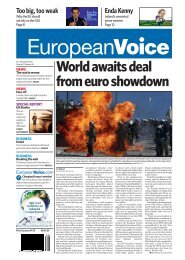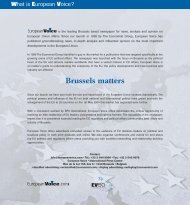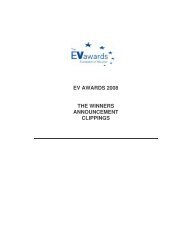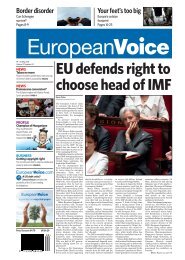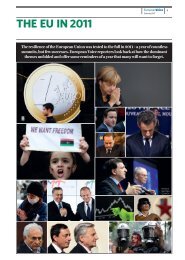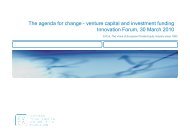special report - European Voice
special report - European Voice
special report - European Voice
You also want an ePaper? Increase the reach of your titles
YUMPU automatically turns print PDFs into web optimized ePapers that Google loves.
COMMENT<br />
30 May 2013<br />
13<br />
Europe’s troika should grow up<br />
Jean Pisani-Ferry<br />
considers the record – and<br />
the future – of the troika<br />
of international creditors<br />
that is ministering to the<br />
EU’s struggling member<br />
states<br />
In early 2010, a group of men<br />
(and a few women) in dark suits<br />
landed in Athens. They belonged<br />
to a global institution, the<br />
International Monetary Fund<br />
(IMF), and to a pair of regional ones,<br />
the <strong>European</strong> Commission and the<br />
<strong>European</strong> Central Bank. Their mission<br />
was to negotiate the terms and<br />
conditions of a financial bail-out of<br />
Greece. A few months later, what<br />
became known as the “troika” was<br />
dispatched to Ireland, then to Portugal,<br />
and later to Cyprus.<br />
This endeavour was bound to have<br />
wide implications. The troika<br />
negotiated what ended up being the<br />
largest financial assistance packages<br />
ever: loans to Greece from the IMF and<br />
<strong>European</strong> partners are set to reach<br />
€240 billion, or 130% of the country’s<br />
2013 GDP – far more in both absolute<br />
and relative terms than any country has<br />
ever received. Loans to Ireland (€85bn)<br />
and Portugal (€78b) are also<br />
significantly bigger than those usually<br />
provided by the IMF.<br />
Moreover, co-operation between the<br />
three institutions is unprecedented.<br />
Back in 1997-98, during the Asian<br />
crisis, the G7 flatly rejected Japan’s<br />
proposal for an Asian Monetary Fund.<br />
Now the IMF has even accepted a<br />
minority-lender role, with the bulk of<br />
assistance coming from the <strong>European</strong><br />
Stability Mechanism (ESM), a new<br />
institution often viewed as an<br />
embryonic <strong>European</strong> Monetary Fund.<br />
It is frequently argued that the size of<br />
the assistance packages is a testament<br />
to Europe’s clout within the IMF.<br />
Perhaps, but the packages are, first and<br />
foremost, a consequence of the<br />
constraints to which <strong>European</strong>s were<br />
(and still are) subject.<br />
Economic adjustment is necessarily<br />
slower within a monetary union than it<br />
is for countries with their own currency,<br />
because, even for very flexible<br />
economies, prices change more slowly<br />
than the exchange rate. Delivering the<br />
same result therefore takes more time,<br />
and requires keeping countries in<br />
intensive care for longer – and at higher<br />
cost.<br />
Three years later, the results are<br />
mixed at best. Unemployment has<br />
increased much more than anticipated<br />
and social hardship is unmistakable.<br />
There is one bright spot: Ireland, which<br />
is set to recover from an exceptionally<br />
severe financial crisis. But there is also a<br />
dark spot: Greece, where GDP has<br />
shrunk by 20% since 2009 and where<br />
the public debt/GDP ratio is now<br />
higher than anticipated at the launch of<br />
the programme, despite the debt<br />
reduction negotiated with private<br />
creditors in February 2012. This is not<br />
because of a lack of fiscal consolidation.<br />
On the contrary, the Greek authorities<br />
have done more than planned on this<br />
front. But the collapse of GDP has<br />
necessarily implied a rising debt ratio,<br />
driving the country into a recessionary<br />
spiral as economic contraction forces<br />
further spending cuts.<br />
Could the troika have done better? It<br />
was not responsible for existing<br />
monetary conditions – a currency union<br />
with a central bank focused on price<br />
stability. But <strong>European</strong> officials’<br />
REUTERS<br />
hesitant response to the crisis added to<br />
the difficulty. Prolonged controversies<br />
over the terms and conditions of<br />
assistance and the absurdly high<br />
interest rate initially set on official<br />
loans exacted a heavy toll on countries<br />
already under stress.<br />
Furthermore, the troika made three<br />
mistakes. First, Greek debt reduction<br />
was postponed for too long. Once it<br />
became clear that the burden was<br />
unbearable, debt should have been cut<br />
expeditiously. Too many creditors were<br />
reimbursed at par on their maturing<br />
claims.<br />
Second, the troika based its<br />
programmes on overly optimistic<br />
assumptions. It misjudged the<br />
consequences of fiscal consolidation<br />
and credit constraints,<br />
underestimating the contraction of<br />
employment and overestimating<br />
exports and privatisation receipts.<br />
Finally, not unlike what happened<br />
during the Asian crisis in the late<br />
1990s, the troika took country cases<br />
one by one. As a result, it did not pay<br />
enough attention to cross-country<br />
spill-overs and deteriorating<br />
conditions in the wider eurozone.<br />
Should the troika survive? Its three<br />
participating institutions have<br />
different mandates and different roles.<br />
It was perhaps inevitable that initially<br />
they worked jointly; but there is reason<br />
to question such an approach now.<br />
Operationally and financially, the<br />
IMF has become much more involved<br />
in Europe than its global shareholders<br />
deem sustainable. It should become a<br />
catalytic lender whose participation in<br />
eurozone programmes remains<br />
desirable but not indispensable –<br />
giving it the possibility to disagree and<br />
walk away.<br />
The ECB is in an odd position as<br />
well, but for different reasons. As the<br />
eurozone’s central bank, rather than a<br />
lending institution, it does not have a<br />
clear role in negotiations on behalf of<br />
creditors. If it remains in the troika, its<br />
participation should be mostly silent.<br />
Finally, Europe should transform the<br />
ESM into a <strong>European</strong> Monetary Fund<br />
capable of providing policy assessment<br />
and advice, as well as financial<br />
assistance – possibly drawing on<br />
<strong>European</strong> Commission staff.<br />
Beyond <strong>European</strong> specifics, the troika<br />
experiment answers a question of major<br />
importance to other parts of the world:<br />
Can the IMF co-operate with regional<br />
institutions? The answer is ‘Yes’ – but not<br />
easily. The troika has proved functional,<br />
and Europe would have been at pains to<br />
provide conditional assistance to eurozone<br />
countries without the IMF’s participation<br />
and support. But co-operation has proved<br />
to be difficult, if only because each<br />
Clean air plays a key<br />
role in keeping people in good health<br />
and preserving the environment. Despite<br />
good progress in recent years, air quality standards<br />
continue to be exceeded throughout the EU, e<strong>special</strong>ly<br />
from pollutants like particulate matter, ground-level<br />
ozone, and nitrogen dioxide. In 2013 the Commission will<br />
review its current air policy. The 2013 edition of Green Week,<br />
the biggest annual conference on <strong>European</strong> environment policy,<br />
will therefore focus on air quality. The Conference will take place<br />
from 4 to 7 June at the Egg Conference Centre in Brussels. Over<br />
three days and some 40 sessions, <strong>European</strong> Commissioners,<br />
MEPs, ministers, scientists, national and local authorities,<br />
NGOs, businesses and the public will focus on fi nding ways<br />
to improve air quality. Green Week offers a unique<br />
opportunity for debate and exchanges of experience<br />
and best practice on environmental protection<br />
issues. It is open to the public and<br />
participation is free of charge.<br />
Green Week2<br />
2013<br />
Brussels 4-7 June<br />
Jean Pisani-Ferry is professor of economics at<br />
Université Paris-Dauphine and currently serves<br />
as director of economic policy planning for the<br />
prime minister of France. This column draws on<br />
a Bruegel <strong>report</strong> co-authored with André Sapir<br />
and Guntram Wolff. © Project Syndicate, 2013.<br />
http://ec.europa.eu/environment/greenweek/<br />
participating institution has rules and<br />
constraints that are not easy to reconcile<br />
with the others’.



